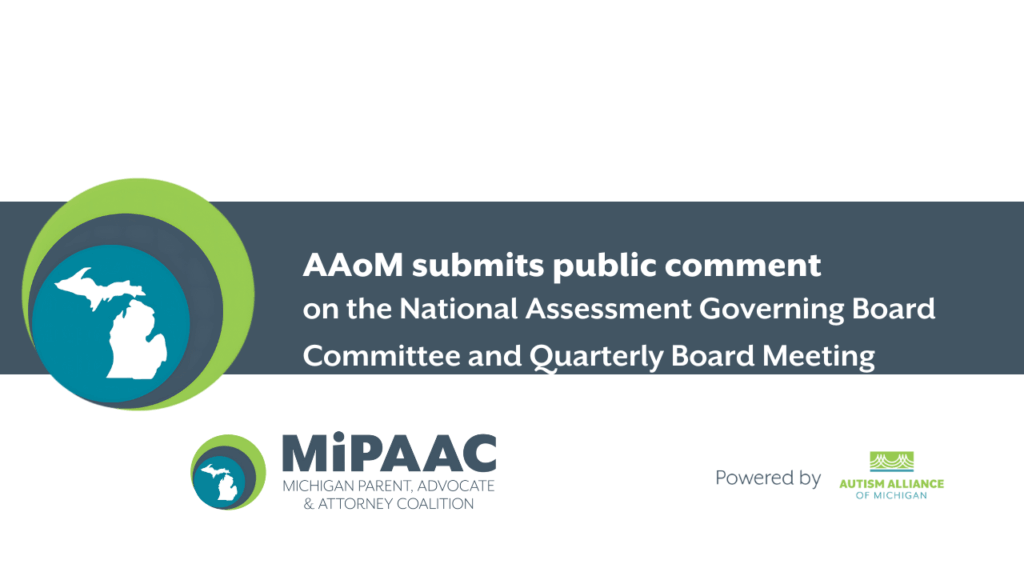Autism Alliance of Michigan Public Comment
Angela Scott, Chief Data Officer: National Assessment Governing Board
Submitted via email: Angela.Scott@ed.gov
November 13, 2025
Read here: Autism Alliance of Michigan Makes Public Comment on NAEP Agenda for November Meeting
RE: Public Comment on National Assessment Governing Board Committee and Quarterly Board Meetings (Federal Register Document 2025–19704)
Dear Ms. Scott:
The Autism Alliance of Michigan (AAoM) appreciates the opportunity to comment on the upcoming National Assessment Governing Board (NAGB) committee and quarterly meetings. We are particularly encouraged by NAGB’s continued attention to the validity, equity, and accessibility of the National Assessment of Educational Progress (NAEP), which serves as the Nation’s Report Card on student achievement.
Why This Matters for Students with Disabilities
NAEP plays a crucial role in shaping understanding of how students are performing across key subjects and grades. These results directly influence educational policy, accountability systems, and the allocation of resources at federal and state levels. For students with disabilities—who represent approximately 15% of the K–12 population—accurate measurement and full inclusion in national reporting are essential to ensuring that their educational experiences and outcomes are visible, validly assessed, and equitably addressed.
Despite longstanding mandates under the Individuals with Disabilities Education Act (IDEA), students with disabilities continue to experience systemic inequities in academic achievement and access to grade-level instruction.
NAEP data, when properly disaggregated and analyzed, can illuminate where these disparities persist and where progress is being made. Ensuring that NAEP results for students with disabilities are robust, comparable across states, and transparently reported is fundamental to advancing educational accountability and improving outcomes.
Key Recommendations
AAoM supports and amplifies recommendations advanced by The Advocacy Institute and other national partners, with emphasis on the following priorities:
- Strengthen Accountability for Students with Disabilities
The U.S. Department of Education should reform the Results-Driven Accountability (RDA) system to better integrate performance outcomes with compliance indicators. The current Results Matrix is not adequately aligned with the IDEA’s purpose of improving educational results and functional outcomes for students with disabilities. NAEP data should serve as one key, objective measure of state progress in improving academic achievement for this population.
- Ensure Continued State Participation in NAEP
Maintaining mandatory participation of all states in NAEP assessments is critical. NAEP remains the only common, comparable measure of student performance across states, including for students with disabilities. These data enable policymakers, educators, and advocates to identify inequities, target interventions, and monitor the impact of reforms. - Prioritize Valid Inclusion and Accessible Assessment Design
Continued work is needed to ensure that NAEP accommodations policies reflect best practices in accessibility, test design, and universal design for learning (UDL). The inclusion of students with disabilities must be meaningful—ensuring that participation rates are high and that results are statistically valid, not excluded or suppressed due to sample size or testing limitations. - Leverage NAEP Data to Inform Policy and Investment
NAEP results should be used to guide federal and state investments in evidence-based interventions that have demonstrated effectiveness for students with disabilities. This includes strategies such as universal screening, personalized instruction, high-dosage tutoring, and professional development for educators to deliver high-quality, accessible instruction. - Address Pandemic-Related Learning Losses
The significant declines in NAEP reading and math performance since the COVID-19 pandemic underscore the urgent need to fully fund and sustain supports for all learners, particularly those with disabilities. Recovery efforts must be data-driven, targeted, and inclusive of students receiving special education services, who were disproportionately impacted by disrupted learning and service delivery.
Conclusion
The Autism Alliance of Michigan urges the National Assessment Governing Board to continue prioritizing the inclusion, accuracy, and transparency of NAEP data for students with disabilities. These data are indispensable for driving equitable policy decisions, ensuring accountability, and fulfilling the federal commitment to provide all students—regardless of disability status—with a free appropriate public education that prepares them for further education, employment, and independent living.
We appreciate the Board’s ongoing efforts to advance assessment equity and welcome continued opportunities to contribute to this critical dialogue.
Respectfully submitted,
Heather Eckner, M.A.Ed.
Director of Statewide Education
About the Autism Alliance of Michigan
The Autism Alliance of Michigan (AAoM) is a 501(c)(3) organization serving as a trusted ally and partner for thousands of families across the state. AAoM’s mission is to lead efforts to raise expectations and expand opportunities for people connected to autism across their lifespan. The organization’s Education pillar drives initiatives that address systemic barriers to education, focuses on student-centered advocacy, and educates families on related topics – working towards its goal to make Michigan a top 10 state for special education outcomes.
For help finding resources, providers, and information, contact our MiNavigators at 877-463-2266 (AAOM) or email at navigator@aaomi.org.
More information about AAoM’s Education pillar can be found at: https://autismallianceofmichigan.org/education-initiatives/.
Learn more about how AAoM is elevating the lived experience, identifying system barriers, and amplifying the voices of parents and students with disabilities connected to the special education system in Michigan to inform our collective advocacy efforts:
Michigan Special Education Finance Reform Blueprint (“MI Blueprint”)
https://autismallianceofmichigan.org/education-initiatives/mi-blueprint/
The MI Special Education Finance Reform Blueprint (MI Blueprint) is a statewide initiative to create a better system— one that aligns funding with actual student needs and ensures schools have the resources to deliver. This work, led by Autism Alliance of Michigan with support from Public Sector Consultants, is backed by legislation and bipartisan support, and it’s grounded in data, experience, and input from families, educators, and advocates.
Special Education Experience (SEE) Survey: Report to the Community
The Statewide Special Education Experience (SEE) Survey was conducted in 2023 to understand the current state of special education in Michigan from the lived experiences of families and students. The survey findings will inform collective advocacy efforts and drive systems-level change to improve outcomes for students with disabilities in Michigan.

